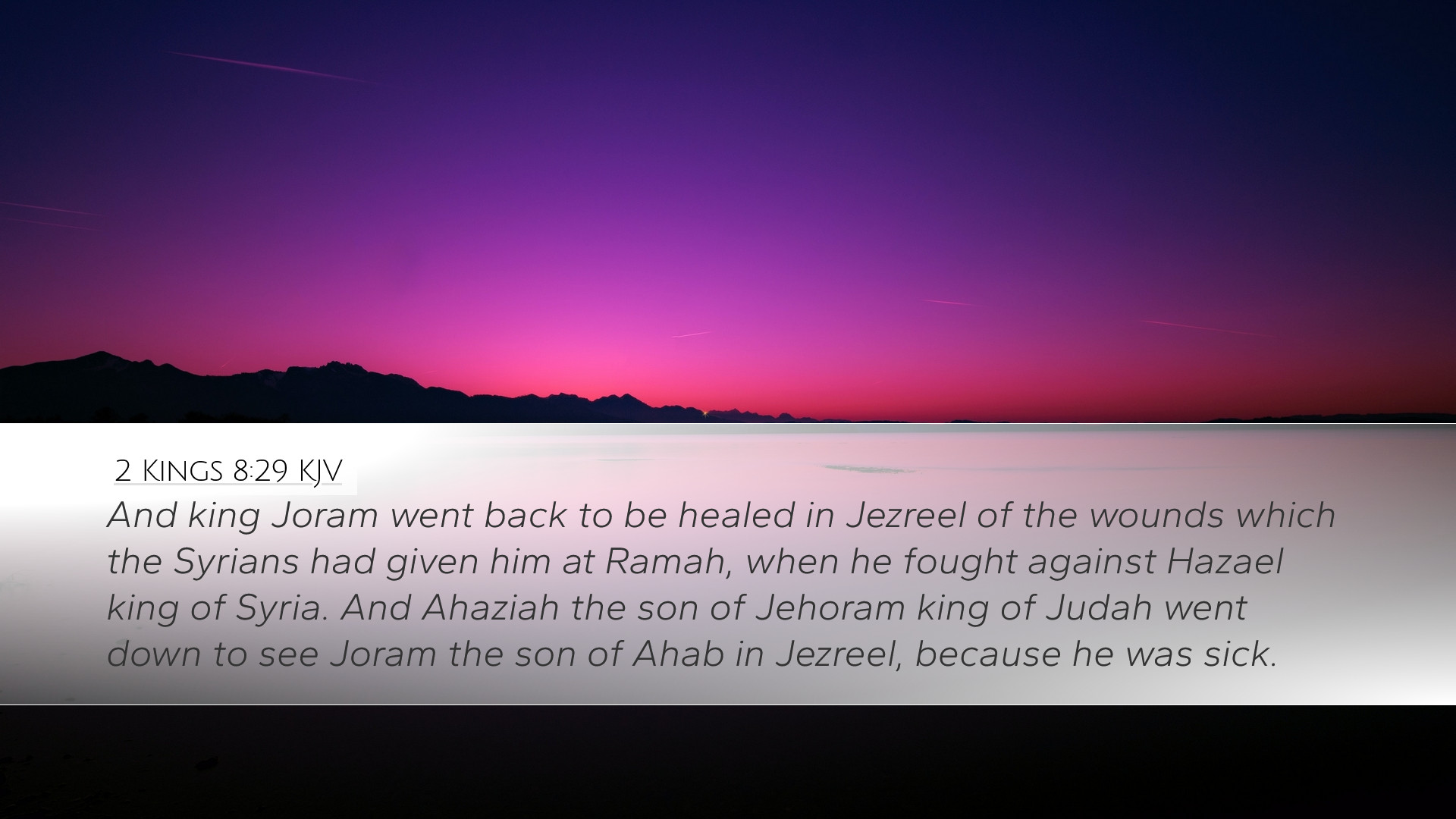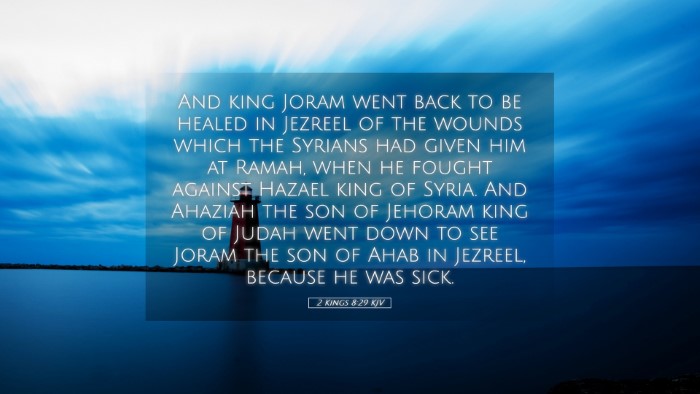Commentary on 2 Kings 8:29
Verse Overview:
2 Kings 8:29 states, "And king Joram went back to be healed in Jezreel of the wounds which the Syrians had given him at Ramah, when he fought against Hazael king of Syria: and Elisha the prophet came to Damascus." This verse encapsulates a pivotal moment in the history of Israel, highlighting the interplay between divine prophecy, political intrigue, and the constant conflict with neighboring nations.
Historical Context
The narrative is set against the backdrop of the tumultuous reigns of Israel's kings. Joram (or Jehoram) son of Ahab ruled during a time of significant distress, faced with military challenges from Syria and internal strife. His injuries, incurred in battle with Hazael, demonstrate the realities of warfare and the precariousness of political power in ancient Israel.
Theological Insights
The verse not only reports a historical event but also serves as a reminder of God's sovereignty over the affairs of nations. The involvement of the prophet Elisha is particularly noteworthy. Elisha's presence indicates that God’s prophetic voice continues amidst political strife, suggesting that the Divine is intricately involved in the affairs of humanity.
Commentary Contributions
Matthew Henry's Perspective
Matthew Henry emphasizes the significance of Joram's wounds, viewing them not merely as physical injuries but as a divine commentary on his reign and character. He reflects on the repercussions of Joram's alignment with the house of Ahab, which brought spiritual and moral decline to the nation.
Henry notes, "Wounds received in battle suggest the realities of divine judgment upon a nation that strays from God." He highlights that the injuries incurred by Joram serve as a metaphor for the spiritual wounds of Israel, indicating a nation caught in cycles of war and disobedience.
Albert Barnes' Analysis
Albert Barnes provides a detailed exposition on the political implications of this verse, specifically the alliances and enmities that marked the relationship between Israel and Syria. He asserts that Joram's withdrawal to Jezreel for healing symbolizes a retreat not only from physical conflict but also from divine leadership.
Barnes asserts, "The visit of Elisha to Damascus signifies that God's prophetic mission transcends boundaries, bringing forth guidance even in foreign lands. Elisha’s role exemplifies God’s continued involvement with His people, showing that divine counsel is ever-present." This underscores the belief that God’s hand is at work through His prophets, irrespective of the political tumult present in Israel.
Adam Clarke's Examination
Adam Clarke brings a more detailed cultural and linguistic perspective. He notes the significance of Jezreel, a city rich in biblical history, serving as a reminder of God’s judgment and the destiny of Israel. Clarke explores the implications of the phrase "healed in Jezreel," asserting it reflects both physical healing and the need for spiritual restoration.
Clarke elaborates, "Joram's healing represents Israel's need for healing from their idolatry and disobedience to God." He suggests that this episode is a microcosm of the larger narrative of Israel’s need to return to God, highlighting the integral role of prophets like Elisha in guiding the nation back to righteousness.
Practical Applications
- Understanding Divine Judgment: Reflect on how divine judgment can manifest in the affairs of nations and leaders today, similar to the narrative of Joram.
- The Role of Prophets: Consider the importance of prophetic voices in contemporary faith communities. How can we discern and respond to God’s guidance in the midst of political and personal turmoil?
- Seeking Healing: Just as Joram sought healing, we are reminded of our need for healing—physically, spiritually, and emotionally. This invites self-reflection and a quest for true restoration through God.
- God’s Sovereignty: Acknowledge that God remains sovereign over world events, and that even amidst suffering and conflict, His plans are at work for His people.
Conclusion
The brief but potent vignette of 2 Kings 8:29 serves as a reminder of the complex interplay of divine sovereignty, human ambition, and the continual need for spiritual restoration. As leaders, scholars, or students of the Word, we are called to seek understanding, remain sensitive to the prophetic counsel available to us, and recognize the ever-present need for healing within our lives and communities.


